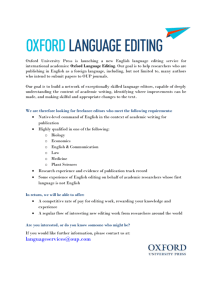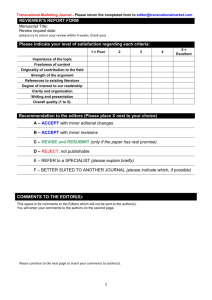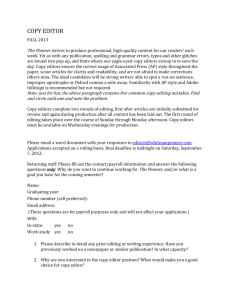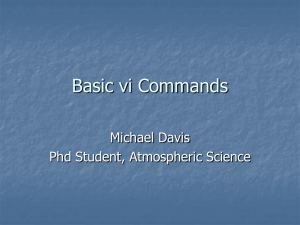Oxford University and Research
advertisement
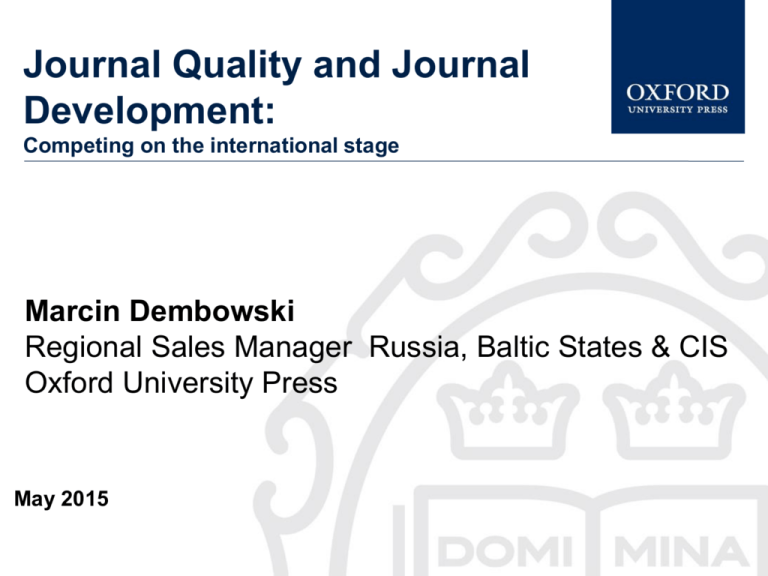
Journal Quality and Journal Development: Competing on the international stage Marcin Dembowski Regional Sales Manager Russia, Baltic States & CIS Oxford University Press May 2015 Agenda • About OUP • Journal Development – What makes a good journal? – Defining goals and why they matter – Achieving goals The University of Oxford Overview The oldest university in the English speaking world. It is a collegiate research based institution. Oxford University and Research Where does it rank? 1. 4* means world leading according to REF Oxford University Press Our Mission Oxford University Press is a department of the University of Oxford. It furthers the University's objective of excellence in research, scholarship, and education by publishing worldwide. John Fell 6 Clarendon Presentation—Tim Barton (November 2011) A Very Short Introduction • Origins date back to 1478 • Largest university press • 25th largest publisher in the world • 6,000 employees worldwide • Over 5,000 titles per year, and 300 journals Oxford University Press Products Support to Students Researchers and Academics OUP in Humanities Scholarly Resources OHO, UPSO, Journals, Research Encyclopaedias Reference Materials ODO, OBO, ORO Framing the question for exploration & reflection Build argument & Support with evidence Oxford Index Generating related OUP content to deepen your search Each resource provides a vital step on the research journey, from quick fact checking, to reviewing the literature in a field, to keeping OUP Resources Fit in your up to date with the latest research. Where do Research Journey? Subject Specific Resources Oxford University Press (OUP) publishes the highest quality journals and delivers this research to the widest possible audience. We achieve this by working closely with our society partners, authors, and subscribers in order to provide them with publishing services that support their research needs. www.oxfordjournals.org Journal Development 12 Starting/Running The Journal 1. 2. 3. 4. 5. Appoint an Editor-in-Chief and Editorial Board Develop conceptual framework Invite authors Peer-review contributions Regular review of progress to determine new topics and update priorities 6. Commission new articles or updates based on user feedback What makes a good journal? • Committed editors and editorial board • Appropriate Aims and Scope – meeting community need • Content – Range of subjects – Quality – Geographical distribution – Volume of content • Robust, ethical peer review • Visibility – how easy is it to find and access your content John Fell • Readership 14 The role of the editor(s) Objective: ambassador for the Journal, working with the Publisher and wider editorial team to set the direction for the journal, establish its reputation, and encourage/process highquality submissions that support the Journal’s mission John Fell 15 Mobilizing the community of experts 16 Global network of research The role of the editor(s) • Setting journals Scope and Strategy • Establishing and enforcing peer review process to select best manuscripts • Commissioning manuscript submissions in areas identified in the Journal’s editorial strategy • Setting Journal policies e.g. authorship, conflict of interest, publishing ethics • Strategic development (supported by others) • Developing and maintaining an extensive network for promotional purposes John Fell 18 The role of the editor(s) Opportunities/Threats solutions decide democracy implement dictatorship Democraship Adizes Institute 1997 - 2015 When do journals need development? • Young journals: – To attract more submissions – To grow into new markets – To increase quality ALWAYS • Mature journals: – To respond to market/competitor changes – To grow into new markets – To increase quality John Fell 20 Lifecycle of an Organization/journal Stable Early Bureaucracy Adizes Institute 1997 - 2015 Role of Editor(s) opporthreats It is not the strongest of the species that survive, nor the most intelligent, but the one most responsive to change. Charles Darwin Growing Aging management Adizes Institute 1997 - 2015 Journal development process 1. 2. 3. 4. 5. 6. 7. 23 Define your mission Assess competition/market Review current position Set clear goals Agree action plans Set milestones Review progress towards milestones Journal development process Review your current position 1. 2. 3. 4. 5. 6. 7. 8. 24 Author demographics Impact factor Subject coverage Reputation/profile Business models Quality of papers Sales/Finances Usage or Perception of the reality is The “Is” way of perceiving reality refers to the present reality. Adizes Institute 1997 - 2015 Perception of the reality should “Should” way of perceiving reality refers to what you believe is the right thing to do, where the value exceeds the cost. Adizes Institute 1997 - 2015 Perception of the reality The “Want” way of perceiving reality refers to what we want to do/be regardless of the cost. want Adizes Institute 1997 - 2015 should is mine Mine What you want should be and it is. want Adizes Institute 1997 - 2015 Perception of the reality “Our journal is the best in Russia/Europe/World.” “We can be the best journal in Russia.” “We should be the best journal in Russia.” Adizes Institute 1997 - 2015 Criteria You Might Look At: • Rankings (example Thomson Reuters Impact factors; the Association of Business Schools ABS etc.) • Number of downloads (utility) • Dissemination of journal (where it is read) • Links to societies/associations • Relevance of content and publishing ethos • International Journal development process Set clear objectives 1. Specific 2. Realistic 3. Consistent 31 Editors are looking for “something new and preferably surprising” according to Dr. Peter Smith, a Cambridge philosopher and former editor of Analysis, the philosophical journal. Be Careful: There are 1,000,000’s of published studies. You need to MASTER your subject/topics: be aware of works completed by others, updates, etc. What makes a good paper? HINT: Editors and reviewers look for … • Originality – what’s new about subject, treatment or results? • Relevance to and extension of existing knowledge • Research methodology – are conclusions valid and objective? • Clarity, structure and quality of writing – does it communicate well? • Sound, logical progression of argument • So what?’ factors! • Recency and relevance of references • Adherence to the editorial scope and objectives of the journal • A good title, keywords and a well written abstract www.oxfordjournals.org www.oxfordjournals.org Disc over abilit y and the Oxfor d 38 Index Disc over abilit y and the Oxfor d 39 Index Disc over abilit y and the Oxfor d 40 Index Journal development process Action plans and milestones • Who to do what, by when? • How will you know you are on the right track? 41 Well managed journal: (P)rovide (P)urposeclient needs functional (A)dminister systematic (E)ntrepreneur proactive (I)ntegrate organic effective efficient effective short run long run efficient Profit English language support for academic researchers worldwide Overview • Oxford Language Editing was launched in early 2014 by Oxford University Press • The services offered by Oxford Language Editing provide english language support to international researchers • These services are for researchers worldwide, wherever they intend to publish their work • Oxford Language Editing helps researchers to maximize their chances of publication, but does not guarantee publication Where are customers come from What do our customers say about us? “I am very satisfied with the quality of editing. The paper I submitted for editing was very technical. The editors helped a lot to make it more reader friendly. They also gave useful tips. I am very satisfied with the customer service. It’s professional, friendly and highly responsive.” (Customer from Switzerland, 2015) Key customer benefits 1. ESTABLISHED LANGUAGE EXPERTISE: Oxford University Press has a unique position at the heart of the English language through its publication of the Oxford English Dictionary, award-winning reference resources, and English Language Teaching materials. 2. EXCELLENT EDITORS: We work with the best editors with experience in research methods and a proven track recording within publishing. They are all subject matter experts with native-level English, and editing experience, who understand the requirements of academic publications and the disciplinespecific terminology. 3. TWO-STAGE EDITING: All work is reviewed by both a language editor and an academic editor. Not only are grammatical, spelling, and linguistic issues corrected by the language editor, but, the academic editor ensures that content is clearly communicated and gives suggestions and feedback. What do our customers say about us? “The turnover speed is quick, the language editing is careful and deep, and the editor gave some general suggestions regarding the research topic such like highlights and ref examples, these are helpful to improve the writing of the paper.” (Customer from China, 2015) Key customer benefits 4. IN-DEPTH FEEDBACK: In the second-stage of our process, our academic editors dedicate time to reviewing the research content in every paper and providing in-depth comments and feedback to the author 5. IMPROVED CHANCE OF PUBLICATION: The high quality work carried out by our language editors and academic editors ensures that work is expressed in the highest quality English and maximizes chances of publication. 6. EXCELLENT CUSTOMER SERVICE: Our dedicated Oxford Language Editing team manages the editing process in-house and provides a personalized service to all researchers. We assign language editors and academic editors who we know will deliver the very best editing service. What do our customers say about us? “My co-operation with OLE was really positive experience. I’m more than satisfied with the editing, which was performed with my article, and especially with quickness of the work and with friendly manner of conversation.” (Customer from Russia, 2014) Key customer benefits 7. EXPERTISE IN EVERY DISCIPLINE: We offer our services in all disciplines, as we have highly qualified freelance editors in Medicine, Science, Humanities, and Social Sciences. 8. COMPETITIVE PRICING: Our pricing is calculated according to the length of the work we are editing; we are priced in line with our competitors and offer discounts for larger numbers of papers. 9. TURNAROUND TIME: We carry out our two-stage editing process within seven working days but will do our very best to accommodate the needs of every researcher. Partnering with institutions • We work with institutions to support their researchers who are preparing work for publication • We offer our services in all disciplines and partner with individual faculties or entire institutions • We offer large discounts to institutions wishing to purchase language editing in large volumes • We offer short-term trials to institutions wishing to use our service before a longer term commercial agreement www.oxfordlanguageediting.com jane.wiejak@oup.com – please contact Jane directly with any questions Research Encyclopedias Oxford Research Encyclopedias • Continuously updated encyclopedias in 20 disciplines • Deliver in-depth interpretative overviews • Written and vetted by scholars for scholars and students • Map the entirety of a field of inquiry; evolve as the field evolves • Direct research journeys to other relevant trusted content 52 Disciplines Covered 53 Thank you! Any questions? marcin.dembowski@oup.com – please contact me directly with any questions 54
